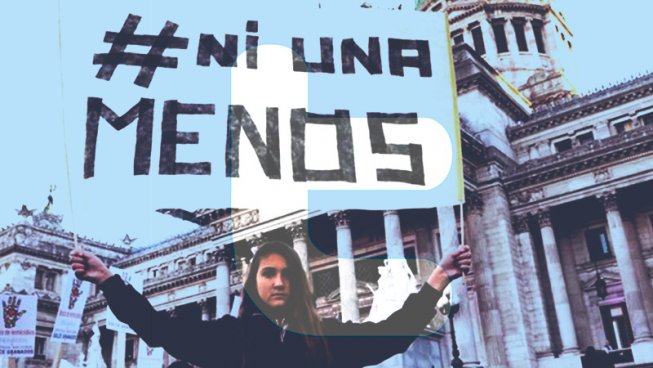Photo: La Izquierda Diario Argentina
A year ago, hundreds of thousands of people mobilized throughout Latin America demanding, Ni Una Menos (“Not one less”), an initiative that began in Argentina in response to femicides that shockingly occupied the front pages of the news. Since then, the number of women killed by machista violence has grown significantly.
This year, #NiUnaMenos returned to the streets with another mass rally. On June 3, one of the main demands resounded powerfully: the legalization of abortion, which is currently criminalized in Argentina and causes the preventable death of nearly 300 women each year. These women are victims of the consequences of unsafe and illegal abortions. Worldwide, this figure rises to 70,000 women per year.
Aerial view of June 3 #NiUnaMenos mobilization in Buenos Aires, Argentina
Violence against women is an open wound that cannot heal. In the absence of policies to even minimally reduce its devastating consequences, the movement against femicide has become a channel of expression for popular discontent with austerity, the state, fare hikes and layoffs affecting working families.
On June 3, student groups, feminists, the Campaña Nacional por el Derecho al Aborto (National Campaign for the Right to Abortion), trade unions and political parties marched through the streets that separate National Congress and the Casa Rosada (presidential palace). Pan y Rosas women’s organization (Bread and Roses), which has branches in other Latin American countries and Europe, also participated in the rally. Several political parties were present, including the leaders of the Partido de los Trabajadores Socialistas (PTS) of the Left and Workers’ Front, who are advancing the call for emergency policies against gender violence.
More than two hundred thousand students and workers departed from Plaza Congreso and marched to Plaza de Mayo with red and violet flags. Many others held rallies that took place simultaneously throughout the country.
Unquestionably, #NiUnaMenos has entered the political agenda of Argentina and Latin America. The movement demands that governments, parliaments, and judicial powers address the gender violence that takes one woman’s life every 30 hours.
In Latin America, the Gender Equality Observatory of Latin America and the Caribbean of ECLAC reported during 2015 that 2,500 women in Latin America were victims of gender violence, 800 more than in 2014. According to the WHO report low-income women are the most affected since this factor makes them more vulnerable to all kinds of violence. In turn, 70% of people living in extreme poverty are women.
Statistics show an exponential rise in femicide throughout Latin America. This information is gathered in most of the countries by non-governmental organizations, women’s organizations and the women’s movement. This is not a minor detail: it is proof of the lack of interest by the State to have accurate records which can enable the governments to create public policies on gender. This is a common denominator in Latin America. By its acts or omissions, the State becomes an accomplice and participant of the increasing violence against women. Taking this into account, many women’s organizations, women’s movements and individuals have decided to take the streets and make visible the violence that thousands of women face every day.
Days before the Ni Una Menos rallies took place in Argentina, people protested against gender violence in Brazil. The video of a girl being gang raped sparked a massive repudiation that poured into the streets.
Violence against women is an inherent problem of the capitalist state, but the government and its political institutions are clearly responsible. Governments’ decisions to allocate low budgets makes them responsible accomplices. According to reports, violence against women is exacerbated by poverty and marginalization, the lack of resources and education, the inability to access an appropriate income to meet basic needs, to access healthcare, and the impossibility of making decisions about their own bodies.
Meanwhile, the judiciary powers legitimize rampant machismo (sexism). The gang rape of a young girl in a Brazilian favela and the charge of aggravated homicide to Belén, a woman from Tucuman, Argentina, for a spontaneous abortion, are just different landscapes with a common denominator: the same actions by the institutions of Argentinean and Brazilian states.
Given the widespread repudiation and rallies that emerged in Brazil when the case of the gang rape became known, Brazilian President Michel Temer announced the establishment of a new police secretariat to deal with crimes against women, an attitude that shows the state’s hypocrisy–expanding the power of an institution plagued by machismo–and reveals its extreme incapacity when the moment to intervene comes to pass.
In Argentina, the attacks on women´s rights are deepened by the government of President Mauricio Macri: the protocols for non-criminalized abortion at hospitals have not been implemented, sexual and reproductive health-care programs are being dismantled and the budget for the protection of victims of violence are being reduced.
Sexist and patriarchal violence is also reproduced in trafficking networks, a lucrative, mafioso “business” for the capitalist-pimps that cannot work without the direct involvement and the cloak of impunity provided by senior members of the repressive forces, politicians and judicial officials.
Ni Una Menos demonstrations have shown that it is, more than ever, necessary to make real what we say in our slogan: If they touch one of us, we will organize thousands (“Si tocan a una, nos organizamos miles”). We must build a militant force of hundreds of thousands of women willing to fight against machismo, governments, judiciary and the institutions that perpetuate and legitimize it. We invite you to join hands with us to take on this task.











